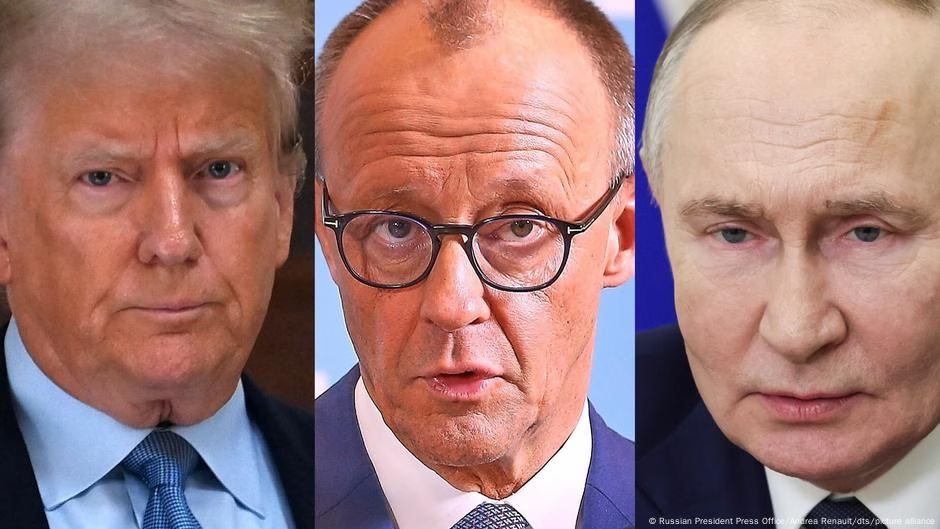This is what conservative Christian Democratic Union (CDU) leader Friedrich Merz stated in the German Bundestag (Federal Parliament), aiming to justify assuming massive new debts — a motion subsequently approved.
Merz is convinced that additional funds will be essential for addressing security and foreign policy challenges faced by the German government.
Atlantic Relations
For ten years, Friedrich Merz served as Chairman of the non-partisan organization Atlantik-Brücke, fostering American-German relations.
However, his trust in a close German-American partnership has been severely strained ever since Donald Trump began his second term in office. Following remarks by Trump attributing the Ukraine conflict to Ukraine and his public belittlement of Ukrainian President Volodymyr Zelenskyy during a visit to the White House, Merz stated, “I am shocked by Donald Trump.” He expressed his disapproval of Trump’s actions and policies, including his stance on the Ukraine conflict.
Germany already had strained relations with Trump when Angela Merkel was Chancellor, mainly due to her open policy toward refugees, which Trump severely criticized. In spite of their political differences, Merz has consistently distanced himself from Merkel, making a personal meeting with Trump unlikely.
Ukraine
The prospective next German Chancellor is already advocating for an additional support package for Ukraine — worth at least €3 billion euros ($3.26 billion). Since Germany’s parliament has already agreed to ease the country’s debt constraints, this allocation should not prove difficult. Nevertheless, if U.S. aid proved lacking and Europe needed to compensate, Germany might face significantly larger financial commitments.
Another contentious issue is the delivery of Taurus cruise missiles to Ukraine. While Merz supports this idea, the center-left Social Democratic Party (SPD), previously led by incumbent German Chancellor Olaf Scholz, has consistently opposed it. The response of the SPD to this issue, in its probable future role as a junior coalition partner, will be interesting to observe.
Defense Cooperation
Uncertain about whether Trump’s America will honor NATO’s obligation to provide assistance, Merz emphasized, on the eve of Germany’s federal election, Europe’s need to “truly achieve independence from the US” as quickly as possible.
Indeed, Germany seeks closer defense policy coordination with European countries. Merz aims to negotiate nuclear protection for Germany and Europe with nuclear powers France and the United Kingdom.
European Union
Merz has accused the current government of Angela Merkel of neglecting European cooperation. He feels that Germany’s relationships with its closest partners — France and Poland — have suffered due to this lack of attention.
However, turning this around will not be easy. Changes in leadership in countries such as Poland have altered the political landscape. Furthermore, the rise of EU skeptics and right-wing populists in other European countries presents additional challenges to closer cooperation.
Trade Policy
The threat of U.S. import tariffs on European goods is seen as imminent. Europe is uncertain about how this situation will unfold. What is certain is that transatlantic trade is becoming more difficult. As an exporting nation, Germany is particularly hard hit, especially considering its recession over the past two years.
The European Union is responsible for transatlantic trade; Germany cannot act alone. However, Germany can and should pressure Brussels to ensure that trade disputes do not escalate into trade wars, which would be detrimental to all parties involved.
China
As a response to the trade conflict with the U.S., some politicians in Berlin and Brussels are advocating for strengthening business ties with China. However, German exports to China, once thriving, are now facing challenges. China has begun producing cheaper electric cars, which are being successfully sold in the EU, potentially threatening the German automotive market. The EU is taking steps to protect its market from Chinese electric cars, and Germany seeks to ensure that trade restrictions with China do not become excessive.
Friedrich Merz has taken a critical stance towards China in the past, criticizing Chancellor Olaf Scholz and his predecessor, Angela Merkel, for not taking a firmer stance against Beijing.
Middle East Conflict
The German government is in a particularly difficult position regarding the Middle East conflict: The security of Israel is a primary concern for every German government. Nonetheless, German politicians have repeatedly criticized Israel’s crackdown on Hamas in the Gaza Strip for being disproportionate.
The German government’s position is further complicated by an arrest warrant issued by the International Criminal Court against Israeli Prime Minister Benjamin Netanyahu concerning alleged war crimes in the Gaza Strip. While Germany supports the ICC, it would be pressured to arrest Netanyahu if he were to visit Germany.
However, Friedrich Merz has stated that such an action would not occur while he is Chancellor.
This article was originally written in German.
While you’re here: Every Tuesday, DW editors provide an update on what’s happening in German politics and society. You can sign up here for the weekly Berlin Briefing email newsletter.







